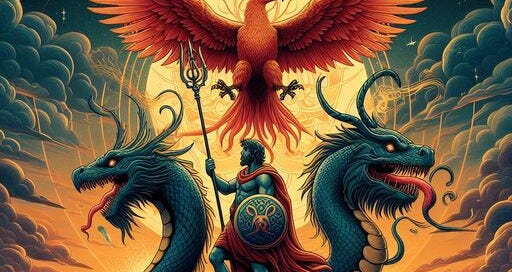Where is this concept from?
Last month in my college library, I saw a tremendously thick book (yes, a book) named Antifragile by the legendary Nassim Taleb. I read it just out of curiosity and got hooked, almost immediately.
The main idea of the book is about something called "antifragility," a term Taleb came up with and explains in the Prologue something like this:
Antifragility is when certain things handle challenges and get better when faced with changes, randomness, disorder, and stress.
These things are adventure, risk, and uncertainty.
There isn't a specific word for the opposite of fragile, so Taleb suggests we call it antifragile.
Being antifragile is more than just being resilient or strong.
While resilient things can withstand shocks and stay the same, antifragile things endure and improve when faced with challenges.
The last line is especially important. And it is the key to understanding the title.
In the first chapter of the book, Taleb uses ancient examples to explain the triad of Fragile, Robust, and Antifragile by comparing them with Damocles, Phoenix, and Hydra.
The Explanation
Damocles is an ancient figure dining under a sword suspended by a fragile thread.
This unreliable setup reflects a fragile state—any slight stress to the thread could prove fatal to Damocles.
The Phoenix is a creature that rises anew from its ashes after each death. You might remember this scene involving Fawkes, that phoenix from Harry Potter, who dies while saving him from the Basilisk.
This resilience represents a robust nature. The Phoenix returns to the same state after enduring significant stress.
Now, the Hydra. This creature embodies the concept of antifragility.
For the Hydra, when a head is cut off, two emerge in its place.
This illustrates a remarkable ability not just to endure stress, but to thrive and grow stronger in the face of adversity.
What to Learn (a note to self)
Life is not a fragile thread like Damocles', teetering on the brink with the slightest stress. This is the point where you have been for the longest time—thanks to the system you and many others are a part of.
When faced with setbacks, or the unexpected, don't just endure—thrive.
Grow stronger, adapt, and face challenges with an attitude that transforms adversity into stepping stones.
In moments of difficulty, remember the resilience of the Phoenix but strive for more. Don't settle for returning to the same state after trials; aim to emerge from challenges not just unscathed, but fortified, and empowered.
Life is one hell of a journey, and every setback is like a personal dare to find the relentless strength within.
Dive into the adventure, give challenges a warm welcome, and see each obstacle as a kick in the pants for your personal evolution.
You’re not merely surviving—you're thriving, a freaking force of nature that turns tough times into epic victories.
To the reader, hope you liked reading this.
Until next time,
Abhishek



